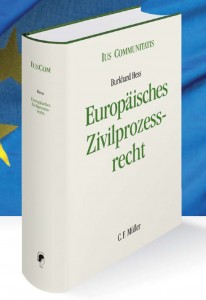Publication: Hess, Europäisches Zivilprozessrecht
Prof. Dr. Burkhard Hess (Heidelberg) has published a comprehensive work on European Law of Civil Procedure:
Europäisches Zivilprozessrecht
(C.F. Müller 2010. XXXII, 752 pages, Hardcover 128 EUR; ISBN 978-3-8114-3304-5)
The publication provides an analysis of the European Community’s legislative competences including the new legal situation under the Treaty of Lisbon, the different instruments of European procedural law, their interpretation and the relationship between the different Community instruments. In addition, the book discusses the preliminary reference procedure provided by Art. 234 EC and gives an outlook on the future developments of European procedural law as well as the possibility of creating a uniform code of European civil procedure.
In particular, the book analyses all relevant Community instruments:
- Brussels I Regulation
- Brussels II bis Regulation
- legal instruments on Judicial Assistance (Service of Documents, Taking of Evidence, Legal Aid)
- Insolvency Regulation
- European Order of Payment Procedure
- European Enforcement Order for Uncontested Claims
- Small Claim Procedure
- Maintenance Regulation
- Directive on Mediation
More information on this book can be found here.




 Centros: 5 votes
Centros: 5 votes